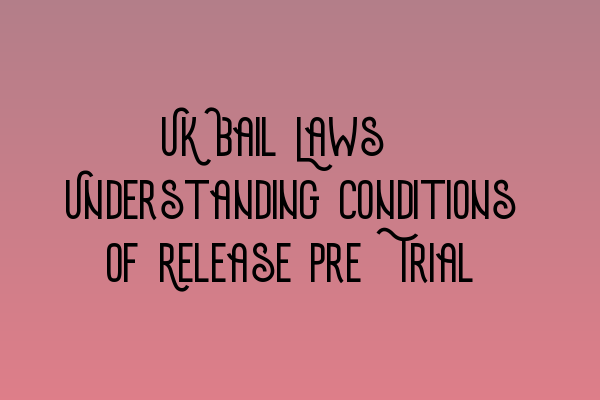UK Bail Laws: Understanding Conditions of Release Pre-Trial
Being arrested and facing criminal charges can be a distressing experience. However, in the UK, individuals accused of a crime have the right to apply for bail, which allows them to be released from custody while they await trial. Bail serves as an assurance that the accused will appear in court when required, without jeopardizing the integrity of the criminal justice system.
It is essential to have a clear understanding of UK bail laws and the conditions that may be imposed upon release pre-trial. This blog post will delve into the various conditions that a court may impose, ensuring that you are well-informed about your rights and obligations.
What is Bail?
Before exploring the conditions of release pre-trial, it is crucial to grasp the concept of bail. Bail is the temporary release of an accused person who is awaiting trial or sentencing. When bail is granted, the individual is allowed to reside at their home or any other specified address instead of staying in custody.
However, it’s important to note that the granting of bail is not guaranteed in every case. The court assesses several factors before making a decision, such as the seriousness of the offense, the likelihood of the accused fleeing, and the potential risk they pose to the public.
Conditions of Release Pre-Trial
When bail is granted, the court may impose conditions to ensure that the accused complies with the requirements of their release. These conditions act as safeguards to mitigate risks such as reoffending, witness interference, or absconding before trial.
Some common conditions of release pre-trial include:
- Residential Requirement: The court may require the accused to reside at a specified address during their period of bail. This could be their home or a place approved by the court. The residential requirement ensures that the accused remains within reach and can be easily located if needed.
- Reporting Requirement: The court may obligate the accused to regularly report to a police station or other designated agency. This condition ensures that the accused maintains regular contact with law enforcement and keeps them informed about their activities.
- Non-Contact Requirement: In certain cases, the court may prohibit the accused from contacting specific individuals, especially if they are co-defendants or potential witnesses. This condition aims to prevent potential witness tampering or interference with the case.
- Curfew Requirement: The court may impose a curfew, limiting the accused’s movement during specific hours of the day. This condition ensures that the accused remains at their designated address during the specified curfew hours, reducing the potential for criminal activity.
- Surrender of Travel Documents: In some instances, the court may require the accused to surrender their passport or any other travel documents. This condition prevents the accused from leaving the country, reducing the risk of them absconding before trial.
It is essential for the accused to strictly adhere to the conditions set by the court. Failure to comply may result in bail being revoked, leading to the accused being returned to custody until the trial is concluded.
Conclusion
Understanding UK bail laws and the conditions of release pre-trial is paramount for individuals facing criminal charges. Adhering to these conditions is not only a legal requirement but also crucial for demonstrating respect for the criminal justice system.
For further information on the SQE Criminal Law & Practice in the UK, be sure to check out our related articles:
- SQE 1 Practice Exam Questions
- SQE 1 Practice Mocks FLK1 FLK2
- SQE 2 Preparation Courses
- SQE 1 Preparation Courses
- SRA SQE Exam Dates
